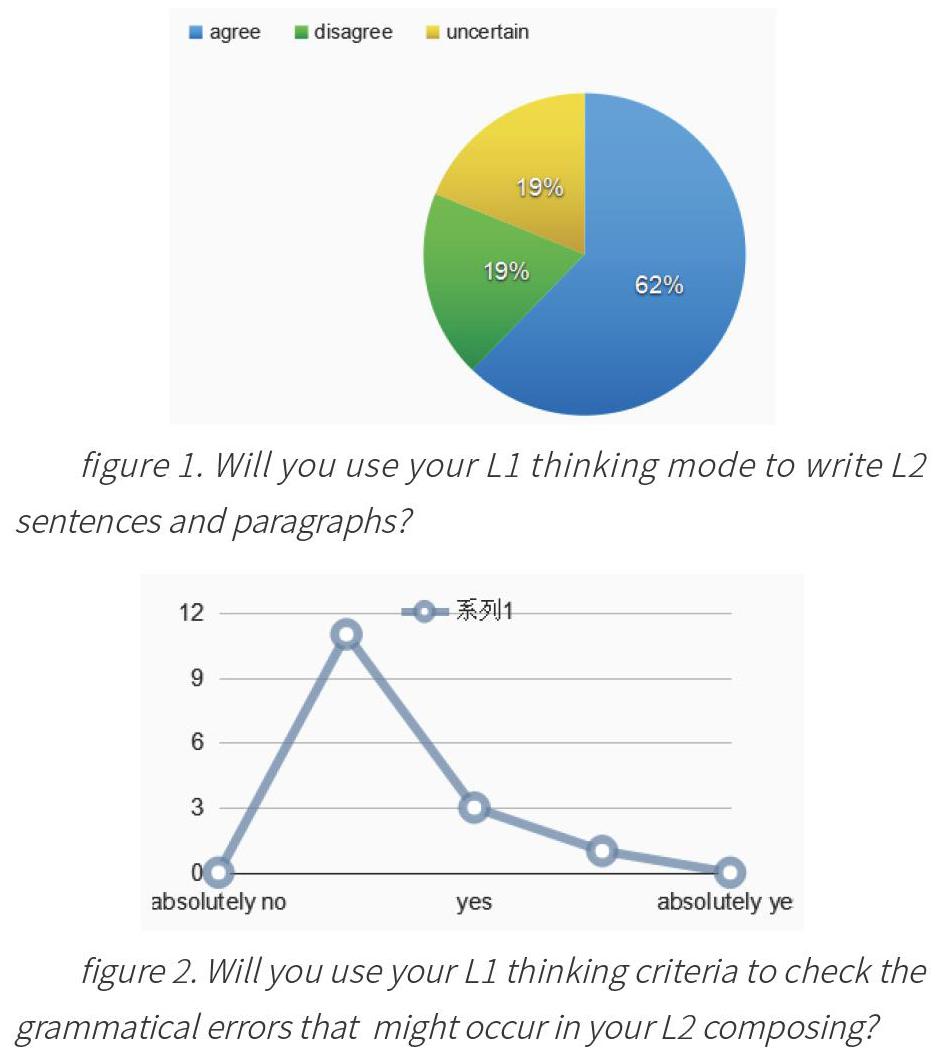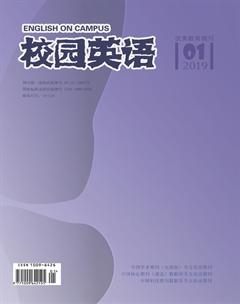A Brief Analysis on the Effects of L1 Thinking Mode on L2 Writing Process: Case Study Based 199on the Chinese EFL Learners

1. Introduction
This thesis explores the effect of L1 (represented Chinese way of thinking) on the English (regarded as L2 writing process). L1 thinking is a common phenomenon in the process of two-language acquisition. For the second language learners in the big Chinese context, the ‘transfer of mother tongue (L1) is a process which cannot be avoided (Cumming 1998). For the second language learners, especially for those with a lower level of L2 who would often find it difficult to obtain the authentic information of second language. In the problem of L1 thinking that lead to the impact on the L2 acquisition, the general idea is that mother tongue thinking hinders the process of second language learning. Therefore, learners should use the second language (L2) thinking and try to avoid the mode of mother tongue thinking.
2. Case study and methodology
In the recent 20 years, research on the L1 and L2 writing processes has grown increasingly. However, for the majority of studies, they have just compared the similarities between the two languages writing processes, emphasized the commonness of the two languages writing strategies, paid less attention on the characteristics of the two language writing characteristics. In fact, there are differences between the source language and target language when learners are dealing with the L2 composing (Liu 2010). Bilingual thinking is a unique phenomenon occurred in the L1 and L2 writing. Studies have shown that during the primary stage of the two languages writing, the process is not a pure transferable thinking process from L1 to L2 (Berg 1999). Thus it generates research questions as follows:
2.1 Will the L1 thinking mode really help with the thinking process when engaged in L2 composing?
2.2 Will the good L1 writing proficiency enhance the L2 writing level?
To investigate these questions, a questionnaire is made to analyze relevant research. Participants engaged in this survey are fifteen Chinese students, among eight of them are postgraduates in UK universities who have been trained in IELTS writing programs; Five of them are postgraduates in universities of Mainland China who have passed the TEM-8 exam; The other two of them are undergraduates in China who have only passed the CET-4 exam. The extracted questions are like: A.“Will you use your L1 thinking mode to write L2 sentences and paragraphs?”, B.“Will you use your L1 thinking criteria to check the grammatical errors that might occur in your L2 composing” etc. And the results showed that:
From the data, we could see that most of the students tend to organize the ideas in their mother tongue before they start the L2 writing. On the contrary, most of them will not use their existing L1 thinking stereotype to check if there are L2 grammar mistakes. Obviously, bilingual thinking is a major feature in the procedure of L1 and L2 writing. However, the study points out the phenomenon of mother tongue thinking in the process of two language writing, but it does not discuss how students use their mother tongue thinking to continue with L2 writing. In addition, the above research objects are mostly from the English major students, and there is no certain description about the non-English major students, or students who receive the lower level of language learning. In addition, the study focuses on the mother tongue thinking on foreign language professional students in the process of writing, as well as the effect of L2 proficiency on L1 thinking. These research topics would enrich our understanding and stress the features of second language writing, thus to help us construct the theoretical framework of L2 writing.
3. Mother tongue thinking of L1 in the processes of foreign language writing
With the increasing communications between various of countries around the world, English as an international language with its status is becoming increasingly important. For Chinese college students who would play an important role in the intercultural communication, English writing ability is indispensable. However in the actual teaching context, more and more teachers have realized their students weak writing ability. Thus, how to effectively improve the students English writing proficiency is a question we should not ignore.
The most influential theory of writing procedures is proposed by Flower and Hayes (Flower and Hayes 1981) which regards composing as a series of decisions or choices. Through their psychological activities of the subjects in the process of writing analysis, they put forward that the traditional writing approach can be called as linear process, namely: planning, translating and reviewing (Flower and Hayes 1981: 366). In their perspective, the writing process could directly reflect the authors thinking processes, namely: generating of ideas, goal setting of objectives and organizing the structure. These three steps contain the concepts of the assessment and modification, encourage readers to write plans which indicate writing process is concerned with writing activities. Therefore, focus should be on how to complete the process, not just be paid attention to the completion of the work itself.
4. Conclusion
In the empirical study, the effects of L1 as Chinese on L2 as English are complicated to expect. Findings of the previous studies show that for L2 learners, the thinking process in the L2 composing is easy to deal with. According to the learning situation of L2 learners, L1 thinking can generate better vocabulary and sentences, though it is not easy to organize with intuitive language thoughts.
Due to the fact that language and thought are inseparable, thinking is the basis of language. Also language is the carrier of thinking, thus we cannot simply consider about the transition of L1. The influence of mother tongue thinking is absolutely inseparable from writing process of SLA, L2 learners should consider the inevitable phenomenon of transition and interference. In order to gradually complete the conversion from L1 to L2 system, learners need to be given the correct guidance to positively participate in the writing. Meanwhile, foreign language teaching should explore on how to avoid the mental process of L1 concept.
Finally, except for English, L2 writing especially in the field of SLA sometimes lack of the studies on writings of other languages. This should be a future scope of research to make L2 writing in a specific language genre. Also, theres inadequate researches analyzing on how to put L2 acquisition into classroom practice. In the future, this issue should be properly applied in the pedagogical teaching of L2 writing.
References:
[1]Berg,E.The effects of trained peer response on ESL students revision types and writing quality[J].Journal of Second Language Writing,1999,8(3):215-241.
[2]Cumming,A.Theoretical perspectives on writing[J].Annual Review of Applied Linguistics,1998,18:61-78.
[3]Cumming,A.Writing Expertise and Second-Language Proficiency [J].Language Learning,1989,39(1):81-135.
[4]Flower,L.and Hayes,J.A Cognitive Process Theory of Writing[J]. College Composition and Communication,1981,32(4):365.
[5]Kroll,B.Second language writing[M].Cambridge[England]: Cambridge University Press,1990.
[6]Lee,I.L2 writing teachersperspectives,practices and problems regarding error feedback[J].Assessing Writing,2003,8(3):216-237.
[7]Liu,M.and Ni,H.Chinese University EFL LearnersForeign Language Writing Anxiety:Pattern, Effect and Causes[J].English Language Teaching,2015:8(3).
[8]Liu,X.An Investigation of Chinese University EFL Learners Knowledge about Writing[D].Language Studies Working Papers,2010, 2:51-63.
[9]Wang,W.Y.&Wen;,Q.F.L1 use and English writing quality[J].Journal of Foreign Languages Research,2002,4:64-76.
[10]Wang,W.and Wen,Q.L1 use in the L2 composing process:An exploratory study of 16 Chinese EFL writers[J].Journal of Second Language Writing,2002,11(3):225-246.
【作者簡介】赖莎(1989.11.23-),女,汉族,现就读于西安外国语大学英文学院2016级外国语言学及应用语言学专业, 硕士研究生,研究方向:应用语言学。

